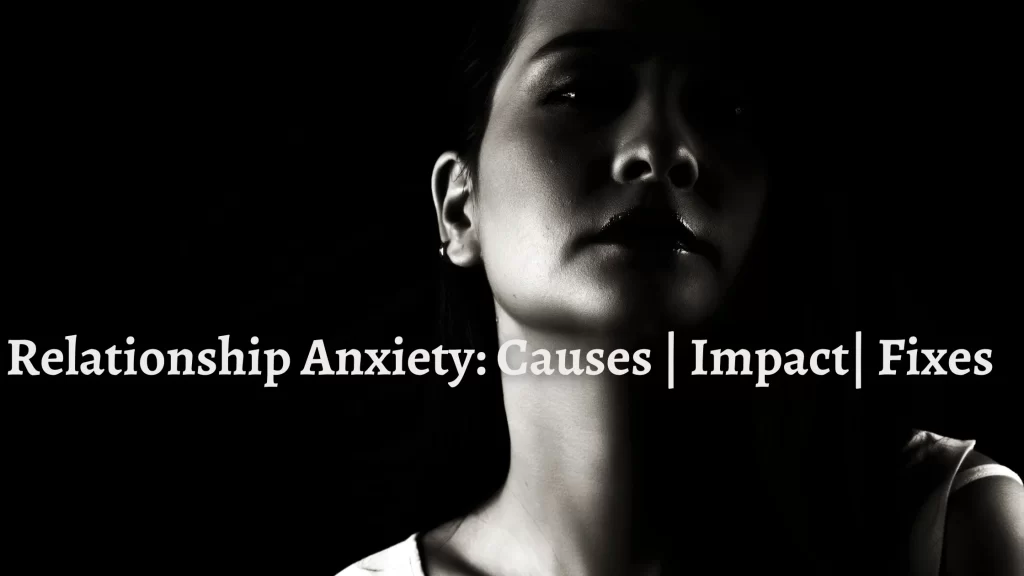Navigating the Challenges of Relationship Anxiety
Being in a romantic relationship can be one of life’s most rewarding experiences, but it can also bring a unique set of challenges, including relationship anxiety. This type of anxiety can manifest in various ways, from constantly worrying about your partner’s feelings for you to doubting your own worthiness in the relationship. If left unaddressed, relationship anxiety can put significant strain on the bond you share with your significant other.
In this comprehensive guide, we’ll explore the depths of relationship anxiety, its causes, manifestations, and effective strategies to manage it healthily. By understanding this common phenomenon, you’ll be better equipped to nurture a thriving, secure, and fulfilling partnership.

What Is Relationship Anxiety?
Relationship anxiety refers to the persistent, excessive worry or fear experienced in the context of a romantic relationship. It can stem from various sources, such as past heartbreaks, attachment issues, or deep-rooted insecurities. Those dealing with anxiety in relationships often find themselves obsessing over their partner’s behavior, over-analyzing every interaction, and fearing the possibility of rejection or abandonment.
Common manifestations of relationship anxiety include:
- Constant reassurance-seeking: Repeatedly asking your partner for validation and reassurance about their feelings for you.
- Jealousy and possessiveness: Feeling threatened by your partner’s interactions with others, even if they’re platonic.
- Fear of commitment or engulfment: Worrying about losing your independence or being consumed by the relationship.
- Doubting your partner’s loyalty: Constantly questioning your partner’s faithfulness or intentions.
- Perfectionism: Putting immense pressure on yourself to be the “perfect” partner.
While some level of anxiety in relationships is normal, especially in the early stages, excessive and persistent worry can become detrimental to the relationship’s health and your overall well-being.
Causes of Relationship Anxiety
Relationship anxiety can stem from various factors, including:
- Past experiences: If you’ve experienced betrayal, abandonment, or heartbreak in previous relationships, it can create a fear of history repeating itself.
- Attachment styles: Your attachment style, which develops in early childhood based on your relationships with primary caregivers, can influence how you experience and navigate romantic bonds.
- Low self-esteem: Negative self-perception and feelings of unworthiness can fuel anxiety in relationships, leading to constant self-doubt and fear of rejection.
- Trauma: Traumatic experiences, such as emotional or physical abuse, can contribute to relationship anxiety and difficulty trusting others.
- Personality traits: Certain personality traits, like neuroticism or anxious attachment styles, can make individuals more prone to experiencing relationship anxiety.
It’s important to note that relationship anxiety can also be a symptom of an underlying mental health condition, such as generalized anxiety disorder, social anxiety disorder, or obsessive-compulsive disorder (OCD).
Impact of Relationship Anxiety
Left unchecked, relationship anxiety can have detrimental effects on both the individual and the partnership. Some potential consequences include:
- Emotional distress: Constant worry and fear can lead to heightened stress, anxiety, and even depression.
- Trust issues: Doubting your partner’s intentions and loyalty can erode the foundation of trust in the relationship.
- Communication breakdowns: Anxiety can make it challenging to express yourself effectively, leading to misunderstandings and conflicts.
- Codependency: An excessive need for reassurance and validation can foster an unhealthy codependent dynamic.
- Relationship dissatisfaction: The strain of anxiety can diminish the joy and intimacy in the partnership, leading to decreased satisfaction for both partners.
Addressing relationship anxiety is crucial for maintaining a healthy, secure, and nurturing bond with your significant other.
Strategies for Managing Relationship Anxiety
While relationship anxiety can be challenging, there are several effective strategies that can help you manage and overcome it:
- Improve self-awareness: Understand your thought patterns, triggers, and emotional responses to better identify when anxiety is taking hold.
- Challenge negative thoughts: Actively question and reframe irrational or distorted thought patterns that fuel your anxiety.
- Practice mindfulness: Engage in mindfulness techniques, such as meditation or deep breathing exercises, to ground yourself in the present moment and reduce worry.
- Communicate openly: Have honest and vulnerable conversations with your partner about your anxiety, its roots, and how they can support you.
- Seek professional help: Consider seeking guidance from a licensed therapist or counselor, who can provide valuable tools and strategies for managing relationship anxiety.
- Build self-esteem: Work on cultivating a positive self-image and nurturing self-love, which can help reduce feelings of unworthiness and insecurity.
- Set boundaries: Establish healthy boundaries to maintain a sense of autonomy and independence within the relationship.
- Foster trust: Actively work on building trust and emotional intimacy with your partner through open communication, vulnerability, and commitment.
Remember, overcoming relationship anxiety is a journey that requires patience, self-compassion, and a willingness to address any underlying issues contributing to your anxious thoughts and feelings.
Creating a Secure and Fulfilling Bond
While relationship anxiety can be challenging, it’s important to understand that it’s a common experience and doesn’t have to define your partnership. By adopting healthy coping strategies and prioritizing open communication with your partner, you can cultivate a secure and fulfilling bond that stands the test of time.
Embrace vulnerability and authenticity in your relationship, and remember that true intimacy comes from embracing each other’s imperfections and supporting one another’s growth. With time, patience, and a commitment to personal growth, you can overcome the challenges of relationship anxiety and create a lasting, loving partnership built on trust, understanding, and mutual respect.
Frequently Asked Questions
What does relationship anxiety feel like?
Relationship anxiety can manifest in a variety of ways, both physical and emotional. Some common feelings include:
- Constant worrying or ruminating over the relationship
- Feeling insecure, doubtful, or inadequate about yourself
- Fearing abandonment or rejection by your partner
- Jealousy and possessiveness over your partner
- Needing excessive reassurance and validation
- Physical symptoms like butterflies, nausea, or racing heartbeat when thinking about relationship issues
This type of anxiety often has you overthinking small things and making catastrophic assumptions about the future of your relationship. The experience can be intimidating and draining.
Does relationship anxiety go away?
Relationship anxiety doesn’t necessarily go away on its own, but it can be overcome and managed with the right strategies. Early on, some anxiety is normal as you build trust and intimacy. However, if it becomes excessive and persistent, it needs to be addressed.
With self-awareness, communication, boundary-setting, and potentially professional help, you can develop healthier thinking patterns and coping mechanisms to reduce relationship anxiety over time. The goal is to get to a place of feeling secure in yourself and the relationship.
Is this just anxiousness, or am I losing my love?
It can be difficult to distinguish between genuine loss of feelings versus anxiety distorting your emotions and perceptions. Excessive anxiety can make you feel detached, doubtful, and hyper-focused on flaws in the relationship.
However, if your anxious thoughts are constant, you’re not enjoying your partner’s company, and you’re feeling emotionally withdrawn for an extended period despite trying to be present, it may reflect waning feelings versus just anxiety.
Self-reflecting honestly and opening up communication with your partner can help provide clarity.
Why does my partner make my anxiety worse?
There could be a few reasons why your partner’s actions seem to trigger or exacerbate your relationship anxiety:
- Your anxiety may stem from your own insecurities or past issues being projected onto them unfairly.
- Your partner may exhibit behaviors that are triggering anxious thoughts/feelings, like seeming distant, unaffectionate, critical, etc.
- You have different attachment styles or ways of showing intimacy that are clashing.
- There is a dynamic or pattern in the relationship perpetuating anxious cycles.
The root may be your own anxious tendencies, your partner’s behaviors, or inadequate communication between you. Being honest with yourself and your partner is important.
What is the root cause of relationship anxiety?
There is no single cause, as relationship anxiety often arises from a confluence of factors, including:
- Personal insecurities and attachment issues developed in childhood
- Negative past relationship experiences like betrayal or abandonment
- Lack of skills or models for healthy relating
- Trauma or mental health conditions heightening anxiety
- Different attachment styles and intimacy needs clashing
- Communication issues and misunderstandings in the relationship
Getting to the root often requires both self-reflection on your tendencies/history, as well as looking at relationship dynamics and patterns objectively.
How do I overcome relationship anxiety?
Here are some effective strategies for overcoming relationship anxiety:
- Build self-awareness to identify anxious thoughts and triggers
- To remain rooted in the here and now, engage in mindfulness practices.
- Challenge negative thought patterns with positive self-talk
- Communicate openly and vulnerably with your partner
- Work on improving your self-esteem and sense of worth
- Set boundaries to maintain independence within the relationship
- Foster trust, emotional intimacy, and conflict resolution skills
- Consider counseling to get to the root and develop healthy coping tools
The key is developing insight into where the anxiety stems from, so you can address it at the core through changing perspectives and nurturing security both within yourself and the relationship dynamic.



